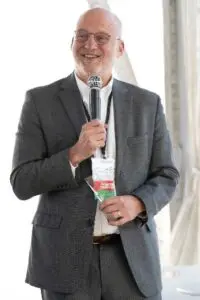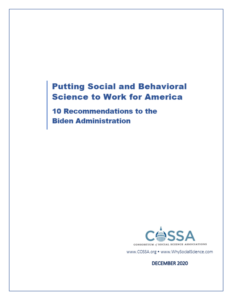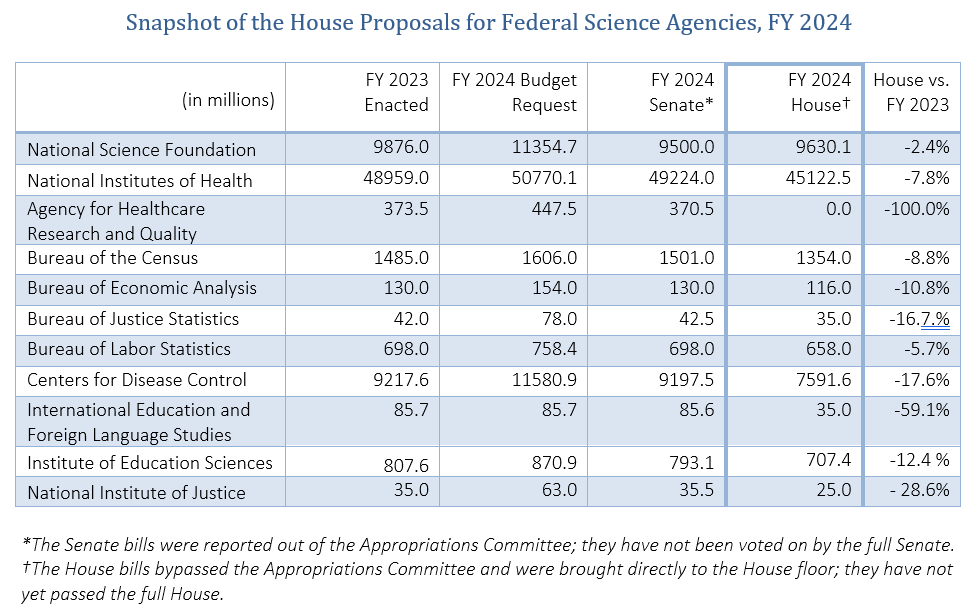COSSA advocates for sustainable federal funding for and widespread use of social and behavioral science research and federal policies that positively impact the conduct of research.
COSSA Statements & Press Releases
COSSA Presents 2023 Distinguished Service Award to American Anthropological Association’s Edward Liebow

Ed Liebow, photo by Mark Finkenstaedt
Washington, D.C. — The Consortium of Social Science Associations (COSSA) has announced the recognition of Edward Liebow, Executive Director of the American Anthropological Association (AAA) and former Chair of COSSA’s Board of Directors, as the recipient of its 2023 Distinguished Service Award. The award was officially presented in Washington, DC at the Celebration of Social Science Reception on April 24, 2023 as part of COSSA’s 2023 Social Science Advocacy Day activities. More information about the award is available on the COSSA website.
“Ed has dedicated his career to the advancement of the social and behavioral sciences,” says Wendy Naus, COSSA’s Executive Director. “Not only is he a respected scholar in his own right, but Ed continues to give of himself on behalf of the entire social and behavioral science community. I, COSSA, and the research community writ large owe a debt of gratitude to Ed for his leadership, guidance, and friendship.”
COSSA Executive Director Wendy A. Naus Named 2022 AAAS Fellow
Washington, D.C. — The Consortium of Social Science Associations (COSSA) is pleased to announce the election of Executive Director Wendy A. Naus to the 2022 Class of Fellows of the American Association for the Advancement of Science (AAAS). According to the AAAS press release, this is “one of the most distinguished honors within the scientific community,” recognizing individuals for their “scientific and socially notable achievements spanning their careers.”
Ms. Naus, who has led COSSA since 2014, is recognized for “leadership in communicating to both Congress and the public the importance of the social and behavioral sciences, and for effective advocacy in support of these sciences.”
Statement on the Retirement of Dr. William T. Riley
Washington, D.C. — The Consortium of Social Science Associations (COSSA) and its member associations congratulate Dr. William T. Riley, Associate Director for Behavioral and Social Sciences Research and Director of the Office of Behavioral and Social Sciences Research within the National Institutes of Health (NIH), on his upcoming retirement and express our deeply felt gratitude for his 16 years of public service.
Over the course of his career, Dr. Riley has worked to amplify the contributions of behavioral and social science research (BSSR) to improving health for all. In particular, during his tenure as Director of NIH’s Office of Behavioral and Social Sciences Research (OBSSR) starting in 2015, Dr. Riley ensured these sciences were integrated into research across the NIH’s Institutes and Centers, helping to shed light on the human dimensions of health.
Dr. Riley has also been a valued partner and conduit between NIH leadership and the external research community. Despite the many demands on his attention and his active collaboration with other federal agencies across the government, Dr. Riley was never too busy to engage in meaningful, impactful conversations with the extramural research community, whether patiently listening to concerns, raising new opportunities, or collectively strategizing ways to best promote our sciences. His receptiveness, generosity, and candor exemplify public service and the behavioral and social science research enterprise is stronger because of his leadership.
COSSA wishes Dr. Riley the very best in his retirement and thanks him for his many years of leadership in the social and behavioral sciences.
COSSA Statement in Support of the National Science Foundation for the Future Act (H.R. 2225)
The Consortium of Social Science Associations (COSSA) is pleased to endorse the bipartisan National Science Foundation for the Future Act (H.R. 2225), introduced by leaders of the House Science, Space and Technology Committee, Representatives Eddie Bernice Johnson (D-TX), Frank Lucas (R-OK), Haley Stevens (D-MI), and Michael Waltz (R-FL). We are especially appreciative of the open and consultative process used to develop this important legislation and attention paid to the utility of the social and behavioral sciences in bringing scientific findings to bear on solving critical societal challenges. Further, the NSF for the Future Act takes a holistic approach to NSF reauthorization, recognizing that U.S. scientific leadership and competitiveness hinge not only on technological advancement, but on support for research starting at the most fundamental level and across all domains of science.
The U.S. scientific enterprise requires stability, predictability, and sustainable funding growth to thrive. Just as importantly, it requires an environment that allows it to invest in the best ideas and take risks to achieve transformative scientific advancements. The NSF for the Future Act authorizes five years of sustained funding growth to address years of stagnant budgets, invests in strengthening the STEM pipeline—most notably, by broadening access to research opportunities to those historically underrepresented—and proposes the establishment of a new Directorate for Science and Engineering Solutions aimed at supporting “use-inspired” research to address “areas of societal and national importance.” Further, it reaffirms peer review as the process by which the scientific merit of individual proposals is assessed, advancing the rigor, impact, and innovation that are hallmarks of world class basic research.
The legislation thoughtfully balances the critical need to preserve NSF’s defining role—to be an incubator for basic scientific discovery across all areas of science—while moving the agency in new and exciting directions. COSSA appreciates the thoughtful manner in which the legislation has proposed establishing a new directorate focused on use-inspired research to address some of the most complex societal challenges, including giving NSF leadership the responsibility to identify focus areas for the directorate. We look forward to continued engagement with the bill’s sponsors to define a role for the new directorate that complements existing NSF research activities, increases opportunities for all STEM fields—including the social and behavioral sciences—and advances the agency’s mission while adhering to its core principles of fundamental research.
Finally, COSSA applauds the attention paid to improving diversity, equity, and inclusion in STEM and ensuring safe and inclusive research experiences free from harassment and discrimination. The legislation recognizes that broadening participation in STEM requires the dismantling of structural barriers at the institutional level—an insight research from the social and behavioral sciences has helped to illuminate. The NSF for the Future Act includes proposals to enhance NSF’s efforts in this regard and expand access to research opportunities by codifying the INCLUDES initiative, increasing resources for graduate training and mentorship, enhancing the Graduate Research Fellowship Program, and creating a pilot program to encourage partnerships with “emerging research institutions.”
NSF’s discovery-driven mission has enabled countless scientific breakthroughs over its more than 70-year history and will continue to guide the American scientific enterprise to new frontiers. COSSA looks forward to working with the bill’s sponsors to develop the strongest possible reauthorization for NSF that includes robust, sustained funding, promotes diversity, equity and inclusion in the scientific enterprise, and keeps the U.S. at the fore of discovery.
Statement on the Biden Administration’s Appointment of Dr. Alondra Nelson as Office of Science and Technology Policy Deputy Director for Science and Society
Washington, D.C. — The Consortium of Social Science Associations (COSSA) is greatly encouraged by the incoming Biden-Harris administration’s choice to elevate the Office of Science and Technology Policy Director’s position to the Cabinet level and especially heartened by the restoration and expansion of the Deputy Director for Science and Society position. “The choice of Dr. Alondra Nelson for the Deputy Director’s post is an outstanding one,” said Wendy Naus, COSSA’s Executive Director. “Dr. Nelson is a highly accomplished and widely recognized sociologist, whose leadership at the Social Science Research Council has been exemplary.”
The Deputy Director’s portfolio is still being developed, but featuring people prominently in the scientific equation is essential. According to Ed Liebow, COSSA’s board chair and executive director of the American Anthropological Association, “At its core, science is a never-ending and self-correcting quest for advancing our understanding of our evolving universe, a quest that is pursued by repeating a three-step cycle: predict – observe – revise our predictions. And here is where ‘society’ plays an essential role. We consider science to be ‘socially situated,’ by which we mean that at any given point in history, specific social and cultural circumstances shape the scientific problems we choose to pursue, the vantage points from which we make observations and interpret their significance, the investments we make in scientific infrastructure, and how we communicate the importance of scientific findings.”
Whether the applications of scientific research are dedicated to tackling such formidable problems as mitigating the effects of global climate change, eliminating health disparities, doing away with race-based and other forms of social injustice, preserving cultural heritage, or reducing the risk of armed conflict, COSSA stands by Dr. Nelson as she takes on this important service in the public interest.
Putting Social and Behavioral Science to Work for America: 10 Recommendations to the Biden Administration

From COVID-19 to racial inequity, climate change to a struggling economy, a disrupted educational system to record-breaking unemployment, the country finds itself in urgent need of immediate policy solutions—solutions that are based on unbiased, sound, and reliable science. Fortunately, there is virtually no aspect of human life that cannot be informed by research in the social and behavioral sciences.
The COVID-19 pandemic has shown that “business as usual” policies and practices, even when it comes to science, are not enough. The Biden-Harris Administration has before it an opportunity to strengthen the U.S. scientific enterprise by making it more sustainable, diverse, and responsive to emerging needs. By investing in and utilizing social and behavioral science insights, the incoming administration can put people back at the center of policymaking.
The Consortium of Social Science Associations (COSSA) is pleased to offer the following recommendations to the incoming Biden-Harris Administration of tangible steps the administration can take to achieve meaningful results using insights derived from the social and behavioral sciences. COSSA and the social and behavioral science research community stand ready to assist the incoming administration “Build Back Better,” tackling the most critical near- and longer-term challenges with the help of science and evidence.
2020 COSSA Rankings Show UNC, Michigan Leading U.S. Universities in Social Science Funding
Washington, D.C. — The Consortium of Social Science Associations (COSSA) has released its 2020 College and University Rankings for Federal Social and Behavioral Science R&D, which highlight the top university recipients of research dollars in the social and behavioral sciences. As in previous years, the University of North Carolina, Chapel Hill and the University of Michigan, Ann Arbor continue to lead the nation in total federal social science research funding. UNC Chapel Hill received $135.6 million in federal social science R&D, with the University of Michigan, Ann Arbor coming in at $106.7 million. The 2020 rankings include 530 colleges and universities, representing a total of $1.9 billion in federal research investment in the social and behavioral sciences. This year’s rankings also feature a dashboard on the COSSA website that allows users to engage with an interactive map of institutions receiving social and behavioral science R&D funding.
“Our 2020 Rankings show how important the social sciences are to higher education institutions across the United States,” said Wendy Naus, COSSA Executive Director. “The federal government’s $2 billion annual investment in research in the social sciences boosts local economies around the country in the short term and leads to tangible longer-term benefits in the form of science-backed findings that make our society safer, healthier, fairer, and more secure.”
Based on federally collected data, the COSSA rankings use an inclusive selection of disciplines representing the breadth of the social and behavioral sciences to calculate the total federal R&D funding received by universities in the social and behavioral sciences. The 2020 rankings reflect spending from fiscal year 2018, the most current available data. More information on how COSSA produces its rankings is available on its website.
Top Recipients of Federal Social Science R&D Funding
- University of North Carolina at Chapel Hill* (NC) – $132,574,000 (#1 in 2019)
- University of Michigan, Ann Arbor* (MI) – $108,666,000 (#2 in 2019)
- University of Minnesota, Twin Cities* (MN) – $47,121,000 (#3 in 2019)
- University of Maryland, College Park* (MD) – $45,712,000 (#4 in 2019)
- University of Southern California (CA) – $34,943,000 (#9 in 2019)
- University of Washington, Seattle (WA) – $33,484,000 (#6 in 2019)
- Arizona State University* (AZ) – $33,327,000 (#12 in 2019)
- Pennsylvania State University, University Park and Hershey Medical Center* (PA) – $33,313,000 (#5 in 2019)
- Boston University* (MA) – $31,900,000 (#25 in 2019)
- New York University (NY) – $30,155,000 (#8 in 2019)
* Denotes COSSA member
COSSA Statement in Support of the Improving Justice Programs through Science Act of 2019 (S. 2286/H.R. 3989)
The Consortium of Social Science Associations (COSSA) supports the Improving Justice Programs through Science Act of 2019 (S. 2286 and H.R. 3989) as introduced by Senator Brian Schatz and Representative Madeleine Dean. The bill would reestablish the Science Advisory Board within the Office of Justice Programs (OJP) at the Department of Justice, the charter of which lapsed in 2018 under the Trump Administration. As an organization that works to promote and advance the role the social and behavioral sciences play in informing policy, COSSA recognizes that having an active science advisory body within the Department of Justice will help ensure criminal justice policies are backed by evidence.
Since its 2010 authorization, the OJP Science Advisory Board worked with staff at the Department of Justice to create guidelines for implementing and evaluating efforts to reduce crime, strategies to address diminishing response rates to critical Department of Justice surveys, and methods for police departments to better communicate with the communities they serve. As the government responds to complex and shifting dynamics in the legal landscape, including implementing criminal justice reform legislation, addressing the challenges of the opioid epidemic, and understanding the impact of new technologies on crime and policing, it is more important than ever that the Department of Justice have ready access to scientific expertise. The Improving Justice Programs through Science Act would help to restore science and evidence to its rightful place in helping to guide criminal justice policy.

